How a bakery found a recipe for global success
- Published
Kontos Foods exports its flatbreads to 12 countries around the world
The delicious smell of butter and freshly-baking bread permeates everything at Kontos Foods' factory in New Jersey.
As hundreds of balls of pitta or pita bread dough make their way down a conveyor belt, two rows of workers hand stretch each one ready for them to go through an oven to be baked.
The hand stretching gives each resulting flatbread a unique look, and is also said to create a better texture.
It is a technique that co-founder Steve Kontos, 57, says he learned from his father, and one he thinks sets the product apart from competitors in both the US, and a growing number of overseas markets.
Mr Kontos and his father Evripides, 87, set up the Kontos Foods together back in 1987.
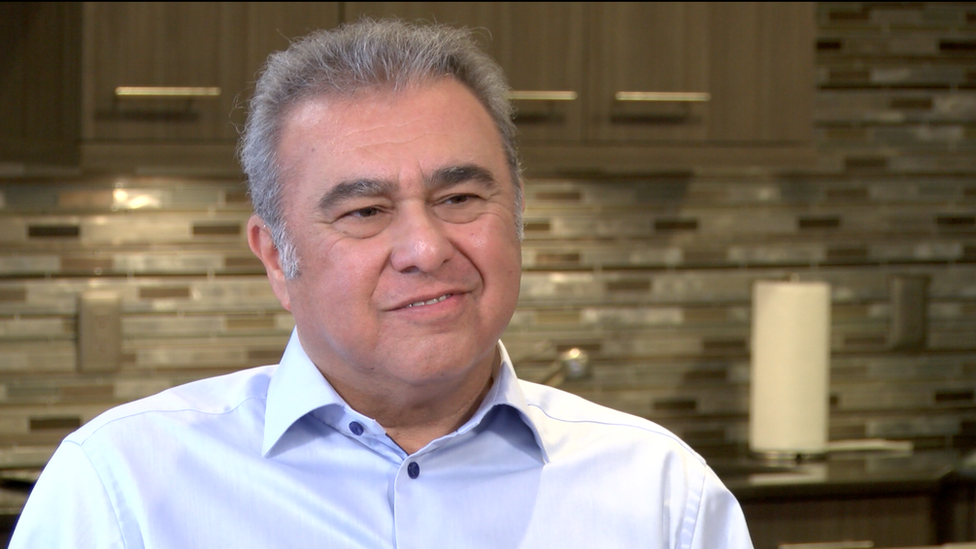
Steve Kontos runs Kontos Foods with his father Evripides
The elder Mr Kontos had emigrated to the US from Cyprus in 1948. A baker by trade, he had run a successful filo pastry firm from 1968 to 1984, before eventually selling up.
Three years later Evripides Kontos decided to set up Kontos Foods, and joined by his son Steve, this time he would specialise in another celebrated food item of the eastern Mediterranean - pitta.
Today Kontos Foods' 200 employees make 450,000kg of pitta and other flatbreads a week at three factories in Paterson, New Jersey, about 10 miles north west of New York City.
Selling across the US both via supplying stores and direct from its website, it also now exports 10% of its production to 12 other countries as it continues a push to increase overseas sales.
"In a normal father-son relationship the son goes 100 miles an hour and it's the father holding him behind," says Steve Kontos. "It was the reverse with me and my dad."
He adds that it was his father who was eager to expand into new product lines, such as olives and cheese.
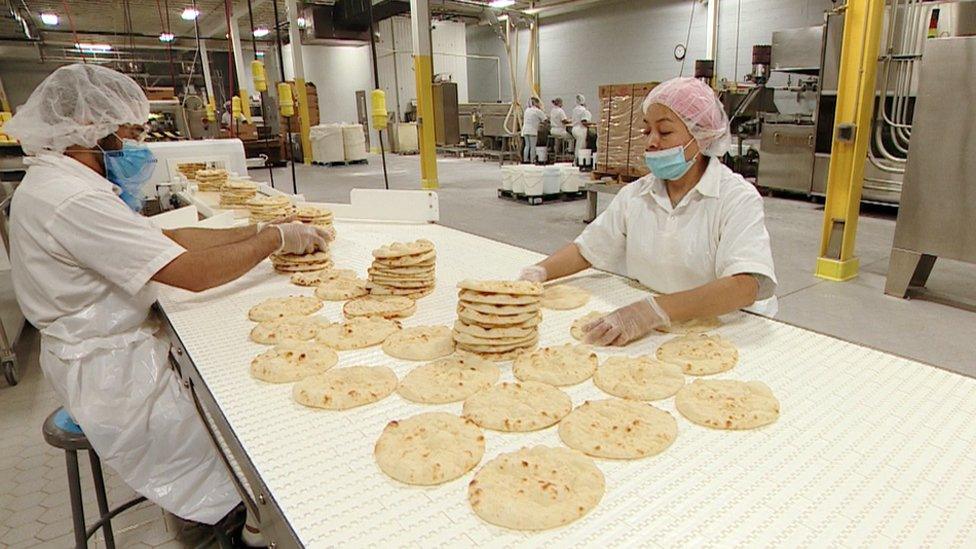
Kontos Foods employs more than 200 people
However, flatbreads remain the main part of the business, and demand is thriving in the US. Total industry-wide sales of pitta alone in the US totalled $117m (£86.2m) in 2017, up from $113m a year earlier, according to one report.
The ethnic diversity of the US has helped Kontos Foods grow. Its products are simultaneously foreign and familiar.
Over the past five years Steve Kontos has led the overseas expansion, and the firm's more than 50 different types of flat breads - from naans to pizza bases - are sold in Europe, East Asia, the Middle East and the Caribbean. It now exports 3.5 million packs of flatbreads per year, out of a total annual production of 35 million.
While all the baking is done from Kontos Foods' main bases in New Jersey, recipes and products are tweaked to meet the preferences of each country.
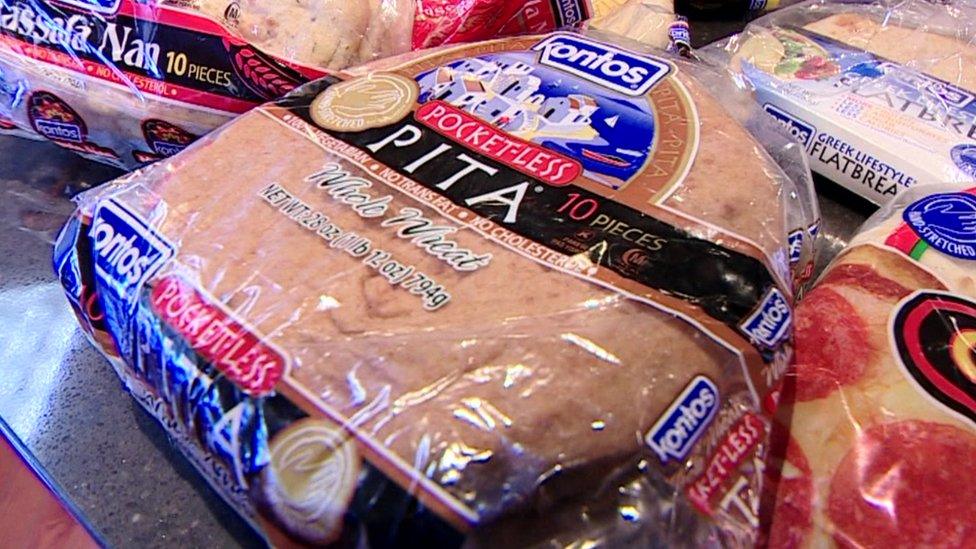
Kontos tweaks its recipes to better meet the tastes in any given country
Orion Kelly, a director of international trade at OCO Global, an economic advisory firm, says that exporters such as Kontos Foods are right to try to tweak their product for each new country they enter.
"Most companies want to move more quickly [abroad] than they should, and so they'll take a rubber stamp approach where they take what works here, and they just go into the market, apply that and often fail," says Mr Kelly.
"There is a chance for success, but I think it's lower when you don't investigate and adapt to that market."
To help drive the international growth, Kontos Foods brought in a former marketing boss from consumer goods giant Unilever, called Warren Stoll.
With support and financial assistance from the US Department of Agriculture, Mr Stoll has been taking Kontos Foods to food trade shows around the world.
"In the last four years or so we embarked to do many different trade shows in the Middle East, in the Far East and in Europe, and that is how we get our name out there," he says.
"The trade shows allow us to get lots of people excited about our product, but it is the distributor who is going to take it into the market and then get it to our customers."
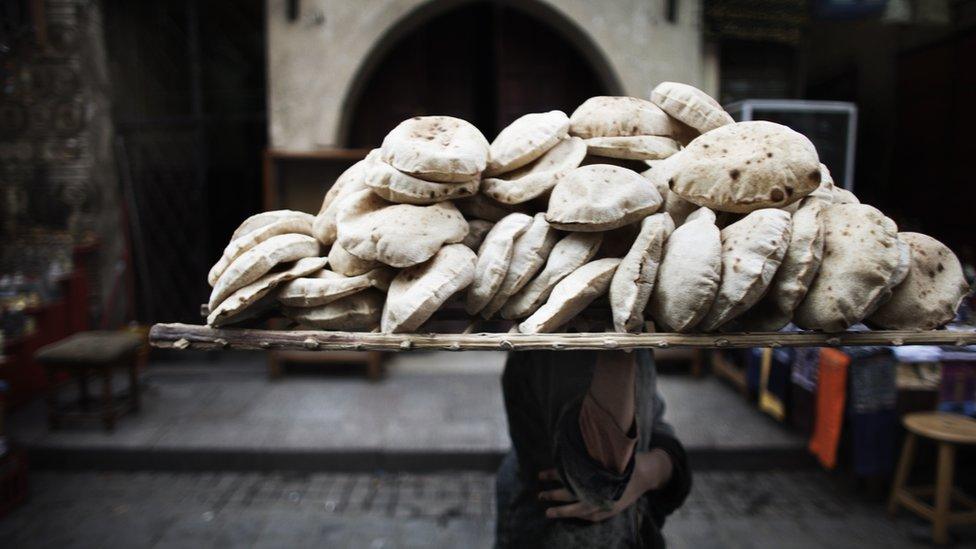
Pitta is a staple of Middle Eastern cuisine which has made it easier for Kontos to break into markets in that region
The company's recent main export push has been to the Middle East, with its products now on sale in Bahrain, Saudi Arabia, and the United Arab Emirates.
With flatbreads so ubiquitous in the Middle East, it may seem odd that a US company would be able to get a foot in the market, but Kontos Foods says it can compete on price against local brands.
And as Steve Kontos says, it is not as if the company has to explain what it sells. "They understand our product line."
The Middle East also offers another benefit - collective importing rules. The countries that make up the Gulf Corporation Council (GCC)- Bahrain, Kuwait, Oman, Qatar, Saudi Arabia, and the United Arab Emirates - all accept the same import labelling and packaging.
This means Kontos Foods only had to draft new packing once to have access to six new markets.
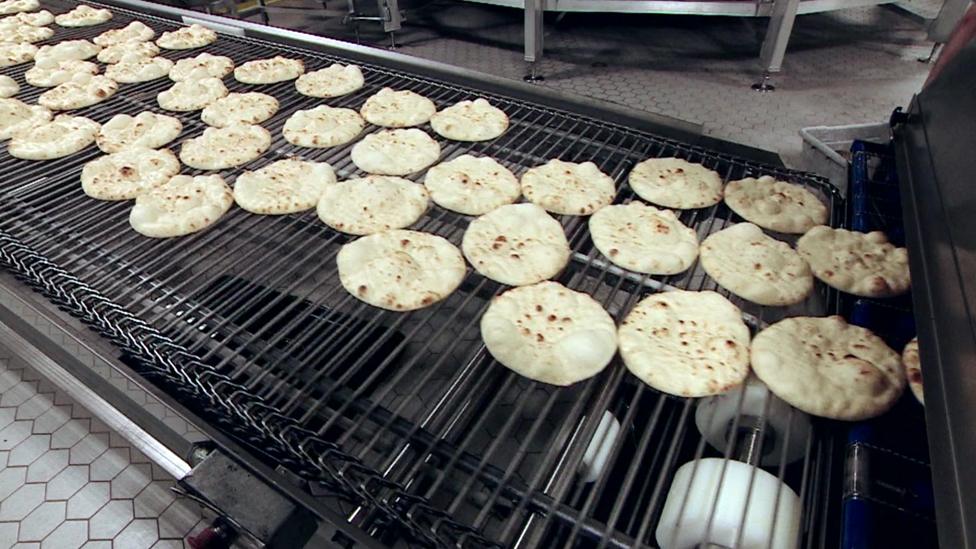
The company makes more than 50 different types of flatbread
Yet the company hasn't only targeted markets that are familiar with its product. It is making a hard push into Japan.
In 2009 the company introduced mini cocktail flatbreads that Steve Kontos says are "perfect" for the Japanese market.
The 5cm (2in) circles are cut from company's traditional flatbread. In the US and Europe, they are advertised for petit fours. In Japan, they are promoted as a perfect accompaniment for a bento box lunch.
Mr Stoll adds: "The Japanese like innovative foods."
To ensure that the bread it sends abroad arrives in tip-top condition, it is exported in frozen form.


This is the latest story in a series called Connected Commerce, which every week highlights companies around the world that are successfully exporting, and trading beyond their home market.

While Kontos has found success in Asia and the Middle East, Europe has proved more difficult. Currently it only sells in Germany.
"The fresh baked goods in places like Germany or the Netherlands, are phenomenal and not to be replicated," says Mr Stoll. "It's hard to bring an outside product into that environment and do very well," says Mr Stoll.

Evripides Kontos, pictured here with his wife, has been a baker all his adult life
Another major challenge has been the number and types of preservatives used in US industrial kitchens. Many of these are banned or do not match European tastes.
Mr Stoll says that these hurdles are not insurmountable.
"The more exposure we get to these markets the more we tailor to them, hopefully that will generate more growth down the road," he says.